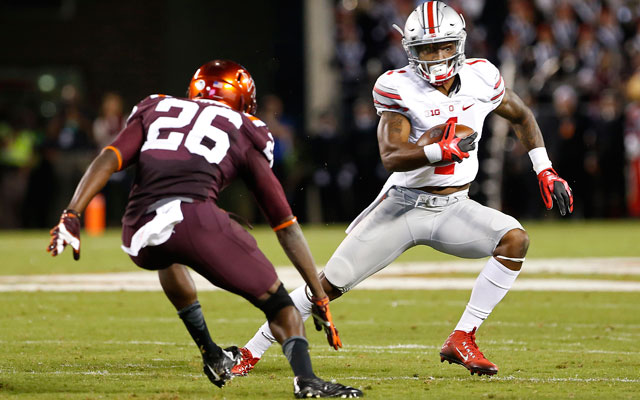Five committee truths that will decide who plays for the national title
Jeff Long wants to clarify something once and for all about last season’s College Football Playoff rankings.
“Let me make it clear,” the Arkansas athletics director/selection committee chairman said in a recent interview. “We do NOT use ESPN’s ‘Game Control’ -- whatever that is. We do not consider it in the room.”
Long spent his Tuesday nights last fall explaining on national television why one-loss Alabama ranked higher than undefeated Florida State, or why TCU was higher than a Baylor team it lost to. Then he watched as the college football media and public parsed his every word in search of deeper revelations about the committee’s methodology.
The “Game Control” incident proved mostly a matter of misinformation. (He only said the committee looks at whether teams “controlled [their] game” -- a.k.a. won convincingly -- at which point everyone assumed he was referring to ESPN’s similarly named computer metric.) In general, though, millions of fans who spent last season weaning themselves off 16 years of the BCS standings should no longer view the selection committee as an entirely foreign concept.
“We make a clear distinction between, what we do is rankings, and what the others (AP, coaches, etc.) do is polls,” said Long. “What makes rankings unique is we’re debating in a room, as opposed to a poll where people might say, ‘This team was third, everyone above them won, everyone below them lost, so OK, they’re third this week.”
Since the end of last season I’ve spoken with several of the participants from last year’s selections and revisited the deliberations leading up to the committee’s all-important final rankings.
Though this season will inevitably play out differently than last, and though there are two new members on the committee (Texas Tech AD Kirby Hocutt and former Vanderbilt coach Bobby Johnson), it may be wise to remember the following lessons learned from 2014 while watching the 2015 playoff race play out.
Going undefeated is not the be-all, end-all. The AP and coaches polls, which date back to the first half of the 20th century, essentially followed one overriding rule: Don’t lose. The longer a team remained undefeated, the higher it rose, regardless of how it played or who it faced. By season’s end, any remaining undefeated power conference team would unquestionably top all off the one-loss teams, and even a weaker-conference team like 2007 Hawaii (which played the nation’s worst schedule) eventually rose into the top 10.
It only took the committee one season to render that mindset obsolete. Then-defending national champion Florida State completed its regular season 13-0 but did it in often underwhelming fashion. The ‘Noles fell as low as fourth -- behind three one-loss teams -- heading into the last weekend of the season.
According to one committee member, there were some in the room that felt FSU should be even lower, and they had the analytics to back them up. The ‘Noles did not even crack the top 10 in power ratings like Jeff Sagarin’s and Football Outsiders’ efficiency rankings. Ultimately they finished No. 3, behind 12-1 Alabama and Oregon.
Marshall ran into much the same roadblock. Despite starting 11-0, the Herd, having played a woefully weak schedule, never cracked the top 25. (They rose as high as 18th in the AP Poll.) And come season’s end, an 11-2 Boise State team earned the New Year’s Six bowl berth afforded to the committee’s highest-ranked Group of 5 champion over 12-1 Marshall.
Beating other top 25 teams is essential. As the weeks went on, Long increasingly answered questions about a particular team’s ranking by mentioning the number of top 25 teams it beat. That’s not a coincidence.
.
.
.
continued
Entire article:
http://www.foxsports.com/college-fo...-bears-tcu-frogs-florida-state-lessons-090115






